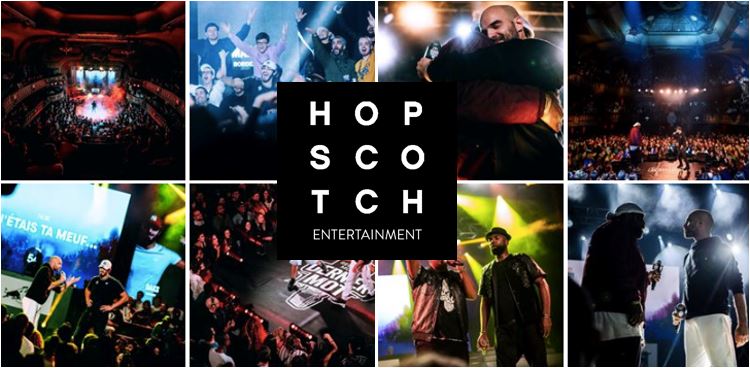Entertainment, a strategic lever for brands
“Entertainment is a real part of HOPSCOTCH’s DNA. The Cinema Festivals (Deauville, Beaune, Gérardmer, etc.), the Apple Expo and the very first Dance Machine… that’s us! More recently, the Dîners de la Création at the Palais de Tokyo and the inauguration of Beaupassage in Paris, show that HOPSCOTCH is still at the forefront of original entertainment experiences. Entertainment is also the essential playground for brand experiences, such as “Music Live VR”, the 1st live concert in VR co-designed by HOPSCOTCH for Orange, and the SXSW, which takes festivalgoers on brand experiences to do with music, film and technologies. Entertainment is an essential vector of relational capital. Whether internal, corporate or consumer audiences, entertainment (music, cinema, sport, culture, etc.) is known for its ability to excite and mobilise audiences. The arrival of Julien Emery, head of HOPSCOTCH Entertainment, confirms our commitment.” So says Valérie Bonnement, deputy managing director at HOPSCOTCH.
“After more than 10 years in music labels (Universal Music: Capitol, Def Jam France, Mercury and Sony Music: Jive Epic), where he specialised in the digital transformation of the industry, as well as in the creation of labels, content and events, combining brands and artists, Julien Emery joined the ranks of HOPSCOTCH to develop and embody the entertainment offer. He explains how entertainment is a strategic lever for customers and the Group and what this solution can bring to brands,” she continues.
Entertainment: in what way is it a strategic lever for customers and HOPSCOTCH Group?
Julien Emery: For some time now, a priority audience has emerged for brands strategies: millennials. Born in a very crowded advertising environment, but above all with a plethora of content at hand, these future consumers are difficult to attract and retain. Passionate and always looking for meaning, they enjoy unique experiences with great Instagramable potential… and that’s where we come in!
HOPSCOTCH Entertainment is the solution to help brands reach and win over millennials, by suggesting that they should no longer just have passions; they should live them.
If there are as many passions as there are millennials, there is only one area of common ground for this entire generation: music.
Tech fan? They have a connected watch and a home assistant, but it is to launch the new Damso album hands-free!
Fashion fan? They have no limit when Drake creates a capsule collection, sold out in 24 hours.
E-sport fan? There’s no question of watching a show without a suitable soundtrack!
Series/film fan? They can’t talk about “Casa de Papel” without chanting “Bella Ciao” or watch “A Star is Born” without downloading Lady Gaga’s best-of at the end of the film!
And if we take a closer look at the figures for the music industry, where 75% of revenues are generated by streaming in the US and 55% in France, it is very likely that music will be a lever favoured by brands in their conquest of millennials.
More specifically, what are the music vectors?
J.E.: Offering a musical experience to an audience of millennials has great benefits for the brands, as it enables them to meet a large number of expectations:
Variety: artists and labels represent an infinite number of styles and talents
Proximity: artists and fans become one on social networks
Experiences that are unique, but that can be shared: a multitude of events (concerts, showcase, festivals, etc.)
Music can also enable brands to become more creative, no longer just selling goods or services, but producing new content, sponsors or simply facilitating meetings between fans and artists.
In addition, by building on influential and often socially aware artists, brands promote values consistent with the expectations of these new consumers who cultivate authenticity and uniqueness, naturally embodied by the talent.
The creation of an original music brand for an advertiser will enable it to reach these communities organically with even greater success. In fact, music is also a way for brands to express themselves at the heart of a setting where the public is not bombarded with advertising, because brand/music partnerships are based first and foremost on an artistic link and not a commercial one. When an advertiser chooses to use music or artists to speak, he or she chooses to prioritise the impact that the operation will have on his or her brand image and, in fact, on the “meaning” that it will have in the heart of millennials, i.e. a form of qualitative and non-quantitative ROI (awareness, NPS, etc.). Such a conscious decision is not a risk for the brands; rather, it’s an opportunity, because there is a real space to be occupied in this environment!
Is this illustrated by your latest achievements?
J.E.: Definitely!
When Orange decided to continue to innovate on content, particularly on VR, we strived to convince them that music was a key vector. Orange became the 1st operator to create a VR live concert by relying on the group, Hyphen Hyphen group its 1st “Live Music VR” (see: article)
When Red Bull wanted to invest in the field of improvisation and dance battles, we helped them to go even further in creating content, by turning the brand into a sponsor that promotes the values of improvisation and urban dance, through the Red Bull Dernier Mot and Red Bull Dance Your Style brands (see: article)
When Blizzard wanted to organise an e-sport event in France as part of the Overwatch World Cup, we created a live digital experience that matches the codes and uses of this particular community. (see: article)
In each of these cases, we combined the brand’s objectives with the creative universe of an artist, a musical genre or a community, to think of experiences and content adapted to a specific audience.
